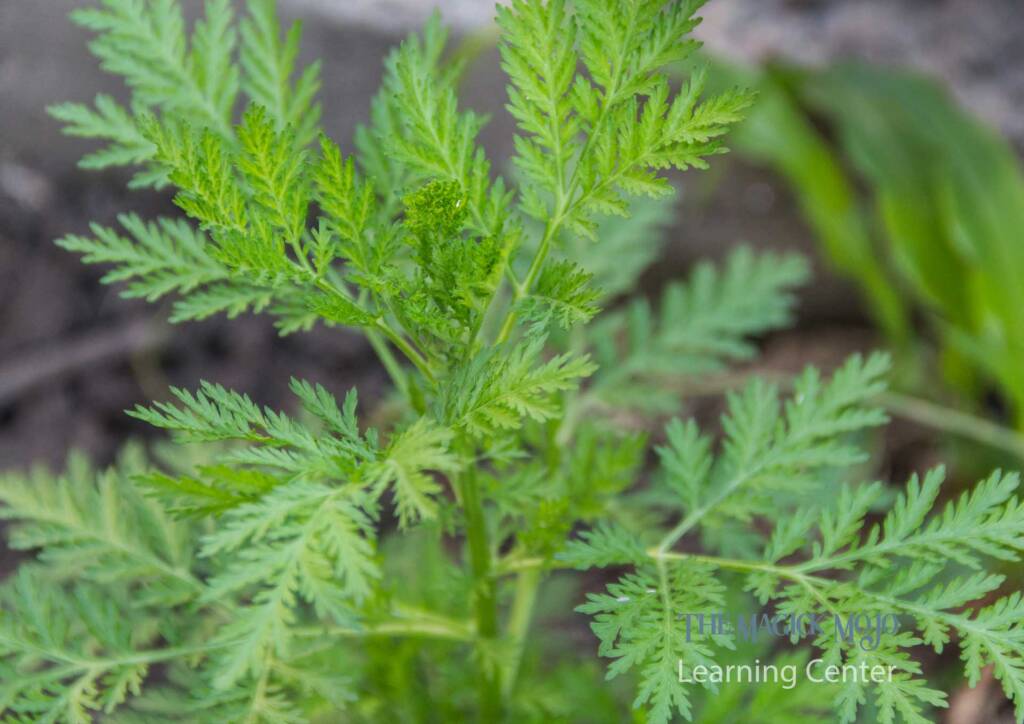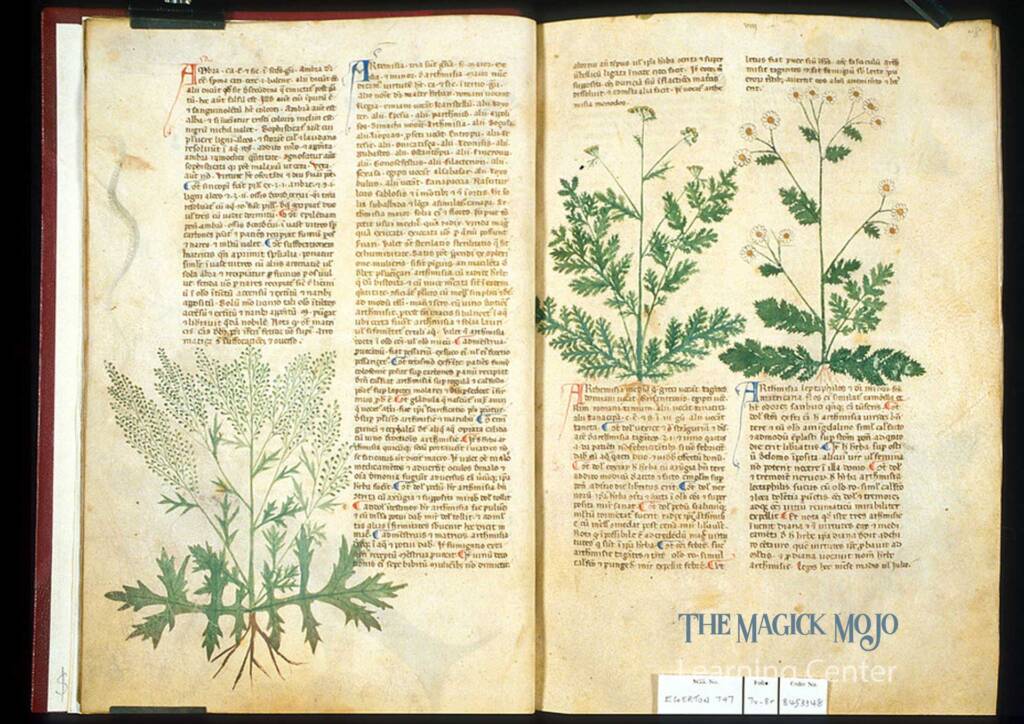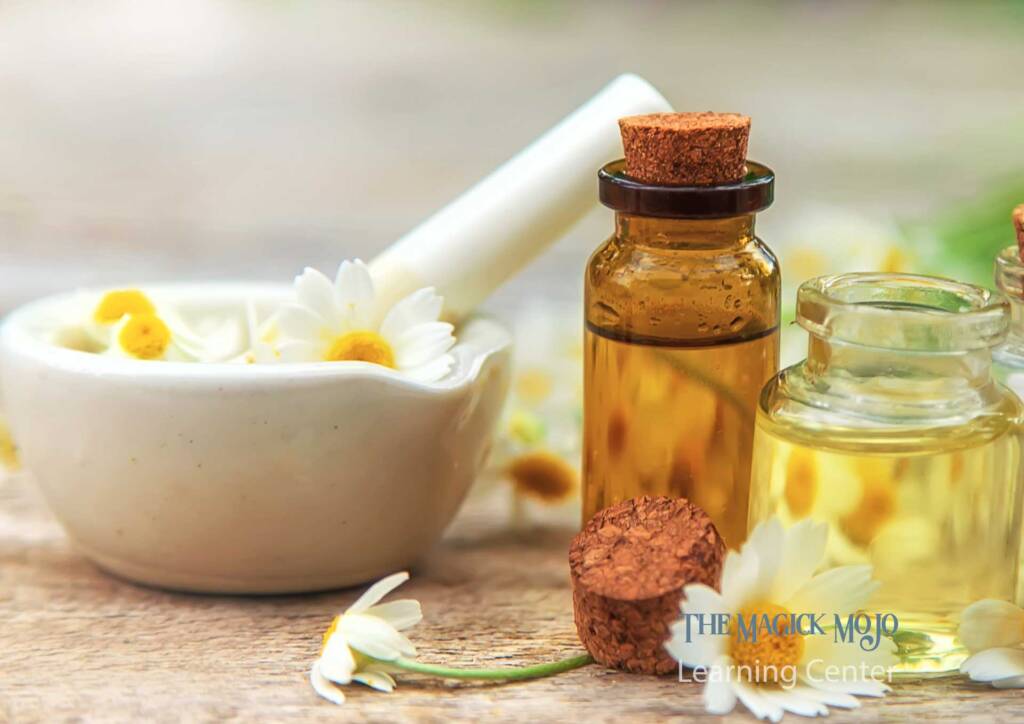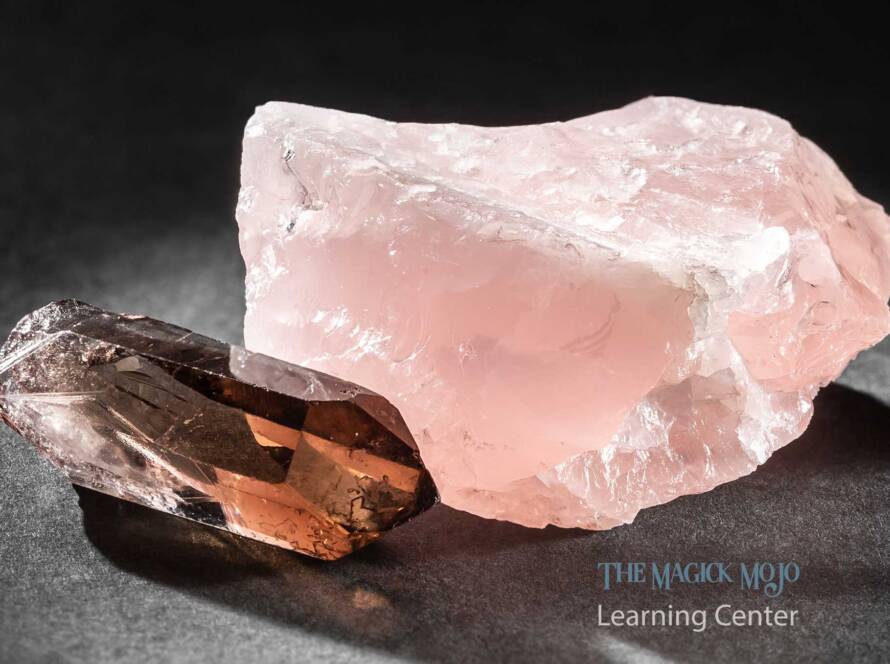Mugwort is an aromatic plant that has been used for centuries for its benefits as a medicinal herb and for its magical properties. It has been used in traditional medicine in many cultures around the world, from Native American to Chinese.
- Table of Contents
Its scientific name is Artemisia vulgaris and it belongs to the daisy family. Mugwort is known for its healing properties, such as anti-inflammatory, anti-fungal, antiseptic, and antispasmodic effects.
In addition to its medicinal uses, mugwort also has a long history of being used for magical purposes. It has the power to protect against evil spirits, ward off bad luck and bring good fortune. It is also used as an ingredient in incense sticks or burned as an herb when performing rituals or spells.
The Benefits & Uses of Mugwort For Health & Well-Being

Mugwort can also be used as a natural remedy for skin problems and allergies. In addition to its medicinal properties, mugwort can also be used in cooking and brewing beverages. The benefits of Mugwort cannot be understated.
- Digestive Health: Mugwort has been used to improve digestion and relieve gastrointestinal issues like constipation, diarrhea, and bloating.
- Menstrual Cramps: Mugwort is known to have emmenagogue properties, meaning it can stimulate blood flow in the pelvic area and uterus, which can help relieve menstrual cramps and regulate menstrual cycles.
- Sleep Disorders: Mugwort is commonly used as a natural sleep aid, as it can help calm the mind and induce relaxation, leading to better quality sleep.
- Anxiety and Stress Relief: Mugwort has been used to relieve anxiety and stress by promoting relaxation and calmness.
- Skin Health: Mugwort has antibacterial and anti-inflammatory properties that make it effective for treating skin conditions like acne, eczema, and psoriasis.
- Pain Relief: Mugwort is used to relieve pain and inflammation associated with conditions like arthritis and rheumatism.
- Respiratory Health: Mugwort has been used to relieve respiratory issues like asthma, bronchitis, and coughs.
- Fever Reduction: Mugwort is known for its antipyretic properties, meaning it can help reduce fever and lower body temperature.
- Blood Sugar Regulation: Mugwort has been shown to have hypoglycemic effects, meaning it can help regulate blood sugar levels in people with diabetes.
- Protection Against Parasites: Mugwort has been used to expel intestinal parasites like roundworms and tapeworms from the body.
⚠️Note: Because Mugwort is an emmenagogue, it should never be used during pregnancy because it can cause a miscarriage. Do not ingest if pregnant!⚠️
Mugwort Through the Ages: Traditional Uses Across Cultures

Embark on a journey through time as we explore the diverse benefits and uses of mugwort across various cultures. From Native American tribes to ancient Chinese medicine, this versatile herb has been cherished for its healing properties and unique attributes. Uncover the rich history of mugwort and learn how different cultures have harnessed its benefits to enhance health and well-being.
- Native American: Native American tribes, such as the Chumash, Paiute, and Iroquois, have used mugwort for various medicinal purposes. The Chumash people used mugwort in a steam bath to relieve rheumatism and soothe sore muscles. The Paiute people made a poultice from the leaves to treat cuts, bruises, and other skin irritations. The Iroquois used mugwort as a digestive aid and to relieve menstrual cramps.
- Chinese: In traditional Chinese medicine, mugwort (known as “Ai Ye” or “艾叶”) has been used for over 2,000 years. It is commonly used in a practice called moxibustion, where mugwort is burned close to or on the skin to stimulate specific acupuncture points. Moxibustion is believed to help treat various ailments such as arthritis, digestive disorders, and gynecological issues.
- European: In European folk medicine, mugwort has been used as a remedy for various ailments, including digestive issues, respiratory problems, and menstrual irregularities. It was also used as a strewing herb, placed on the floor to release its pleasant aroma and repel insects. Additionally, mugwort was often used in brewing beer before the introduction of hops.
- Korean: In traditional Korean medicine, mugwort (known as “Ssuk” or “쑥”) is used to treat various health issues, such as digestive disorders, skin conditions, and gynecological problems. It is also used in cooking and as an ingredient in traditional rice cakes called “tteok” (떡).
Throughout the ages, the benefits of mugwort have transcended cultural boundaries, making it a staple in traditional medicine and practices worldwide. By understanding the various ways in which mugwort has been utilized, we can appreciate the depth of its healing power and incorporate its benefits into our own lives. As we continue to explore the vast world of herbal remedies, let the enduring legacy of mugwort serve as a testament to the extraordinary potential of nature’s gifts.
The Magical Properties of Mugwort and How It Can Enhance Your Life

Mugwort has a variety of magical properties and has been used in various spiritual and magical practices. Here are some of the common magical properties associated with mugwort:
- Protection: Mugwort is believed to have protective properties and can be used for psychic and physical protection. It is said to protect against negative energy, spirits, and harm.
- Divination: Mugwort is associated with psychic and intuitive abilities and is used in divination practices such as scrying and dream work. It is believed to enhance psychic abilities and intuition.
- Cleansing: Mugwort is believed to have purifying properties and can be used for cleansing and purifying spaces, objects, and people. It is often used in smudging ceremonies and can be burned as incense for purification.
- Dream Work: Mugwort is often used in dream work and is believed to enhance dream recall, lucid dreaming, and astral travel. It is said to help with spiritual and psychic insights during dreams.
- Healing: Mugwort is associated with healing and is used in various healing practices. It is believed to have anti-inflammatory and antiseptic properties and can be used for physical and emotional healing.
- Psychic Awareness: Mugwort is believed to enhance psychic awareness and can be used to open the third eye chakra. It is said to enhance spiritual and psychic experiences and can be used in meditation and spiritual practices.
Mugwort Recipes for Everyday Use

Here are some mugwort recipes that you may find interesting:
- Mugwort Tea: Mugwort tea is a popular way to consume mugwort. To make it, simply steep dried mugwort leaves in hot water for 5-10 minutes. You can add honey or other sweeteners to taste.
- Mugwort Tincture: Mugwort tincture is a concentrated form of mugwort that is used for medicinal purposes. To make it, soak dried mugwort leaves in alcohol (such as vodka or brandy) for several weeks, then strain the mixture and store it in a dark bottle. The tincture can be taken orally, or diluted in water or juice.
- Mugwort Oil: Mugwort oil can be used for skin care and aromatherapy. To make it, infuse dried mugwort leaves in a carrier oil (such as olive or jojoba oil) for several weeks, then strain the mixture and store it in a dark bottle. The oil can be applied to the skin or used in a diffuser for aromatherapy.
- Mugwort Salve: Mugwort salve can be used for skin conditions like eczema or psoriasis. To make it, infuse dried mugwort leaves in a carrier oil (such as coconut oil) and beeswax, then strain the mixture and pour it into a jar. The salve can be applied topically as needed.
- Mugwort Smudge Sticks: Mugwort smudge sticks are used for purification and cleansing purposes. To make them, bundle dried mugwort leaves together and tie them with string. Burn the smudge stick and use the smoke to cleanse a space or object.
- Mugwort Rice Cakes: Mugwort rice cakes are a traditional Korean dish that is made with mugwort powder. To make them, mix mugwort powder with glutinous rice flour and water to form a dough. Flatten the dough into small discs and cook in a pan until browned on both sides. Serve with soy sauce or other dipping sauces.
Overall, mugwort can be used in a variety of recipes for medicinal, skin care, and culinary purposes. Be sure to follow proper dosage guidelines and consult with a healthcare professional before using mugwort for medicinal purposes.
Explore More: Additional Resources on Mugwort

Expand your knowledge of mugwort by delving into these carefully curated resources. We have compiled a list of books and websites that offer further information on the history, uses, and benefits of this versatile plant.
Books:
- “Dreaming with Mugwort: A Plant Spirit Short Read (Dreaming with the Plants)” by Heather Sanderson Through introducing concepts of active imagination, shamanic practices, and how to connect and dream with Plant Spirits (and what that means), this short book provides insight, encouragement, and practical application for you to discover or strengthen your relationship with the plant world in general and Mugwort in particular.
- “The Mugwort Spirit Journal: A Plant Ally Reflection Diary and Grimoire” by Pagan Essentials The perfect Book of Shadows for those passionate about mugwort, herbal healing, and nature-based spirituality. Each practitioner experiences a unique connection with plants, and this book will help you uncover the personal message mugwort has for you. By keeping track of your interactions and rituals with this remarkable herb, you can better understand its significance in your practice. The grimoire pages provided allow you to document important aspects of your rituals, such as the lunar phase, invoked deities, magical tools used, emotions experienced during spellwork, the final manifestation date, and the ultimate outcome of your magic. Additional journal pages offer space for reflecting on your experiences with mugwort, noting herbal medicine recipes, recording divination sessions, and jotting down spells. This one-of-a-kind journal and grimoire has been designed to assist witches, pagans, and Wiccans in deepening their understanding of mugwort correspondences and enhancing their magical practice. A bonus garden tracker is included at the end of the book for your convenience.
Websites:
- The Herbal Academy – Mugwort (https://theherbalacademy.com/mugwort/) The Herbal Academy offers an in-depth article on mugwort, covering its history, uses, and benefits. The website also provides educational resources and courses on herbalism.
- Mountain Rose Herbs – Mugwort (https://mountainroseherbs.com/mugwort) Mountain Rose Herbs is a reputable supplier of organic herbs, including mugwort. Their website features detailed information about mugwort’s properties and traditional uses, as well as tips on how to incorporate it into your daily life.
- Mugwort Herbals (https://www.mugworthherbals.com) Mugwort Herbals is an online resource dedicated to all things mugwort. The website offers information on the plant’s history, benefits, uses, and recipes, as well as an online store selling various mugwort products.
- The Modern Herbal – Mugwort (http://botanical.com/botanical/mgmh/m/mugwor61.html) The Modern Herbal is a comprehensive online resource for herbal information. The website features an extensive entry on mugwort, including its history, uses in traditional medicine, and folklore.
With these resources at your fingertips, you are well-equipped to further explore the fascinating world of mugwort. Whether you’re interested in its medicinal properties, culinary uses, or magical associations, these books and websites will provide you with a wealth of information to deepen your understanding of this versatile plant.
JOIN OUR COVEN
Share the Magick
Ready to embark on a magical journey with mugwort? Help us spread the enchantment by giving this article a like, sharing it with your fellow herb enthusiasts, and leaving a comment with your thoughts or experiences. Let’s keep the wisdom of mugwort flourishing and inspire even more people to discover its remarkable benefits!


